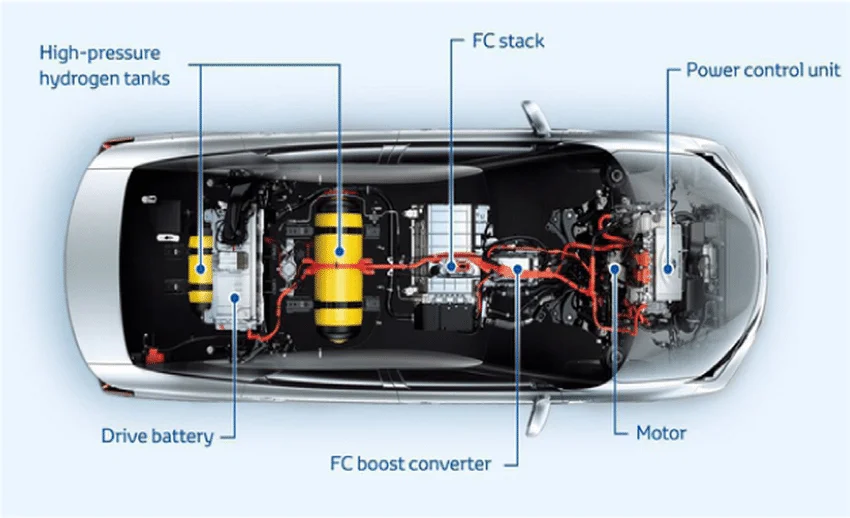Introduction
Automotive fuel cell systems are revolutionizing the path to zero-emission mobility, with major manufacturers, governments, and technology suppliers working aggressively to commercialize hydrogen-powered vehicles. Fuel cell technology is propelling the industry toward cleaner, longer-range, and more efficient transportation while shaping future energy infrastructure from the ground up.
Industry Growth and Forecast
According to Straits Research, the global automotive fuel cell system market size was valued at USD 5.14 billion in 2024 and is expected to grow from USD 7.24 billion in 2025 to reach USD 111.48 billion by 2033, growing at a CAGR of 40.73% during the forecast period (2025–2033). This extraordinary growth is powered by global decarbonization initiatives, robust investments in hydrogen infrastructure, and the accelerating rollout of fuel-cell commercial vehicles and passenger cars.
Key Players and Competitive Landscape
Major automotive and technology firms are driving technological advancement and market adoption:
-
Toyota (Japan): Pioneer with its Mirai fuel cell sedan and ongoing partnership with BMW to develop compact, high-efficiency fuel cell stacks for multiple vehicle architectures.
-
BMW (Germany): Collaborating with Toyota, recently unveiled fuel cell prototypes offering a 25% reduction in system footprint and higher power densities for next-generation vehicles. Production of dedicated hydrogen energy components begins in late 2026.
-
Honda (Japan): Launched specifications for its next-generation fuel cell module with more than double durability, reduced cost, and compact design; mass production of power generator and module planned for 2026–2027.
-
Hyundai (South Korea): Fuel cell innovation leader in commercial vehicles; launched hydrogen-powered buses and trucks through partnerships with IVECO (Italy).
-
Cummins (USA): Opened new hydrogen fuel cell production center in Germany, enhancing capacity for European OEMs and advancing hydrogen transit projects.
-
Ballard Power Systems (Canada): Supplier of PEM fuel cell stacks to automakers worldwide, expanding support for bus, trucking, and off-road vehicle applications.
In addition to these titans, other established players like Nikola Motors (US), General Motors (US), and Bosch (Germany) are rapidly developing scalable, cost-effective hydrogen propulsion for light, medium, and heavy-duty vehicles.
Country-Wise Updates
Japan
Japanese policy and R&D are central to hydrogen mobility, with Honda and Toyota spearheading next-generation fuel cell engine development and public-private infrastructure programs. The government’s hydrogen business consortiums invest heavily in supply chains and refueling stations, supporting broader FCEV adoption.
Germany
Germany is driving hydrogen corridors and commercial fleet deployments, with projects like CryoTRUCK and H2BusEurope aiming to scale refueling networks and heavy-duty vehicle fleets. German facilities at BMW, Cummins, and Ballard Power Systems are at the forefront of stack innovation and production scale-up.
South Korea
Hyundai leads in hydrogen mobility with fleet deliveries of FCEV buses and trucks, supported by state-run fuel cell R&D and infrastructure development in partnership with European manufacturers.
China
China’s commitments to hydrogen transit are backed by multiple automakers and government incentives. Advances in fuel cell buses, logistics vehicles, and pilot programs are rapidly expanding domestic uptake.
USA and Canada
American and Canadian companies, notably Cummins, Ballard, Nikola Motors, and General Motors, are pushing commercial deployments and R&D in urban transit and intercity trucking, securing joint ventures across Europe and Latin America.
Technological Trends
-
PEMFC Dominance: Polymer Electrolyte Membrane Fuel Cells (PEMFCs) represent roughly 91% of recent automotive fuel cell installations, favored for reliability, high power density, and operational flexibility. Innovations focus on cost reduction and platinum catalyst optimization for mass production.
-
Downsizing and Power Density: New systems feature smaller footprints and increased volumetric power density, supporting installation in various vehicle types and architectures for greater design flexibility.
-
Durability and Lifetime: Honda’s next-gen module targets double the operational life at half the cost versus previous models, with advanced thermal management and shock resistance.
-
Direct Methanol and Alternative Fuel Cells: While PEMFC dominates, Direct Methanol Fuel Cells (DMFC) and Solid Oxide designs gain interest for niche or specialized applications, offering more flexibility and efficiency improvements in certain segments.
-
Infrastructure Expansion: Global hydrogen corridor projects and public-private partnerships are rapidly increasing refueling stations, enabling large-scale commercial deployment across key geographies.
-
Commercial Vehicle Focus: Logistics and freight companies increasingly adopt fuel cells for trucks and buses, where fast refueling and long range are critical.
-
Climate and Regulatory Drivers: COP26 and the Paris Agreement commitments motivate accelerated hydrogen transitions in transport, as nations pursue long-term decarbonization goals.
Recent News Highlights
-
BMW and Toyota Partnership (Germany/Japan): Announced new compact fuel cell stacks with improved efficiency and range, targeting launch in 2026–2027.
-
Honda Next-Gen Module (Japan): Unveiled advanced specifications for its new fuel cell module and power generator, with more than double the durability and flexible installation supported by expanded cooling and layout optimization.
-
Cummins (USA/Germany): Launched new hydrogen fuel cell production facility in Germany to support European OEM growth.
-
Hyundai and IVECO (South Korea/Italy): Rolled out hydrogen buses and commercial vehicles for European transit, with support from EU hydrogen corridor initiatives.
-
Global Infrastructure Projects: German CryoTRUCK, H2BusEurope, and Asian hydrogen supply chain platforms fast-track commercial fuel cell adoption, building toward thousands of new refueling locations globally.





